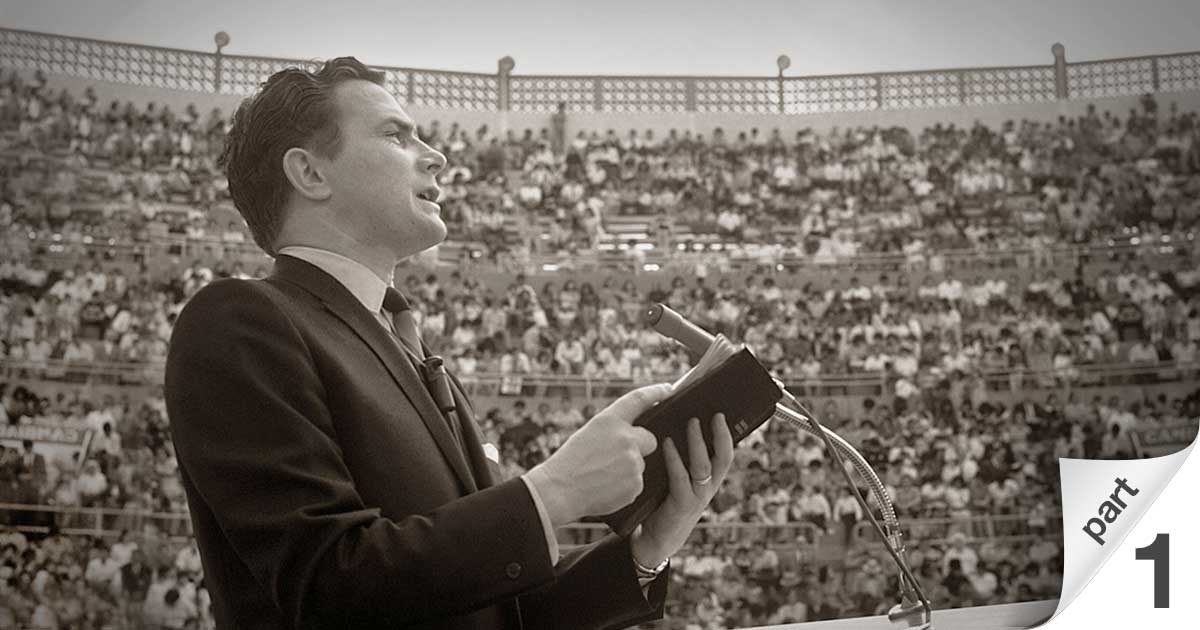One of the greatest destroyers of faith is timing that doesn't fit our preconceived notions. We live in a fast-paced world where we have come to expect instant responses to every desire and need. Instant coffee.
Instant potatoes. Instant cash from the little money machine. Instant relief for sore muscles and minor backache. It's almost our birthright to make the world jump at our demands. But God doesn't operate that way. He is never in a hurry. And sometimes, He can be agonizingly slow in solving the problems we bring to His attention. It's almost enough to make an impatient believer give up and try something else.
Before bailing out, however, we should take another look at the story of Mary, Martha, and their brother, Lazarus, as told in John 11. The members of this little family were among Jesus' closest friends during the time of His earthly ministry. Verse 5 says, "Jesus loved Martha and her sister and Lazarus." It was reasonable, given this affection, for them to expect certain favors from Jesus--especially if life--threatening emergencies ever occurred. Indeed, they were soon confronted by precisely that situation when Lazarus became desperately ill. His sisters did the logical thing--they sent an urgent note to Jesus, saying, "Lord, the one you love is sick" (v. 3). They had every reason to believe He would respond.
Mary and Martha waited and watched the road for Jesus' appearance, but He did not come. Hours dragged into anxious days with no sign of the Master. Meanwhile, Lazarus was steadily losing ground. He was obviously dying. But where in the world was Jesus? Did He get the message? Didn't He know the seriousness of the illness? Didn't He care? As the sisters sat vigilantly at his bedside, Lazarus soon closed his eyes in death.
The sisters were grief stricken. Also, they must have been extremely frustrated with Jesus. He was out there somewhere performing miracles for total strangers, opening blind eyes and healing the lame. Yet here they were in critical need of His care, and He was too busy to come. I can imagine Mary and Martha saying quietly to each other, "I just don't understand. I thought He loved us. Why would He abandon us like this?" They wrapped Lazarus in graveclothes and conducted a sad little funeral. Jesus did not attend. Then they said good-bye to their brother and lovingly placed his body in a tomb.
Mary and Martha loved Jesus with all their hearts, but it would have been reasonable for them to have been annoyed when He showed up four days later. They may have been tempted to say, "Where have You been, Sir? We tried to tell You that Your friend was dying, but we couldn't get Your attention. Well, You're too late now. You could have saved Him, but apparently there were more important things on Your mind." Mary's actual words were much more respectful, of course. What she said was, "Lord,...if you had been here, my brother would not have died" (John 11:21). She wept as she spoke and the Lord was "deeply moved in spirit and troubled" (v. 33).
Jesus then performed one of His most dramatic miracles as He called Lazarus out of the tomb. You see, the Master was not really late at all. He only appeared to be overdue. He arrived at the precise moment necessary to fulfill the purposes of God--just as He always does.
With no disrespect intended, let me say that what happened there in Bethany is characteristic of the Christian life. Haven't you noticed that Jesus usually shows up about four days late? He often arrives after we have wept and worried and paced the floor--after we have sweated out the medical examination or fretted our way through business reverses. If He had arrived on time we could have avoided much of the stress that occurred in His absence. Yet it is extremely important to recognize that He is never actually late. His timetable for action is simply different from ours. And it is usually slower!
Let me illustrate this concept from my own experience. In 1985 I was asked by the United States Attorney General, Edwin Meese, to serve on his Commission on Pornography. It was without doubt the most difficult and unpleasant assignment of my life. For 18 months, the 10 other members and I handled a thankless and nauseating responsibility. We traveled extensively and examined the most wretched magazines, books, films, and videotapes in existence anywhere in the world. Since the United States is the fountainhead for obscenity worldwide, we were immersed in this filth for what seemed like an eternity. Furthermore, the pornographers and smut peddlers tracked our commission like a pack of wolves following a herd of caribou. They did everything they could to intimidate and humiliate us.
I remember sitting in the public hearings day after day with various types of cameras, including videos, aimed at my face. I could see my reverse image reflected in their lenses for hours, which tends to make one self-conscious. The photographers were waiting for me to do something embarrassing, such as make a weird face or put my finger near my nose. One day when I stood up to leave for a lunch break, I turned around and was confronted by a photographer and his clicking camera just inches from my face. Always, there were microphones taped beside my place at the table to record every whispered word or remark. My comments were then parodied the following month in various pornographic publications. "Hustler" magazine superimposed my picture on the backside of a donkey, awarding me the title Ass___ of the Month. The attorney general never said it would be easy.
These efforts at harassment were momentary irritants. Bigger guns would be rolled out later, and they were fired soon enough. A $30 million lawsuit was filed by three organizations, "Playboy," "Penthouse," and the American Magazine Association, shortly before we issued our final report. It named as defendants every member of the commission, its executive director (Alan Sears), and Attorney General Edwin Meese. The complaint was a trumped-up bit of legalese that our lawyers said was totally without merit. Attorneys at the Department of Justice told us not to worry--the case should be thrown out of court in short order. They were wrong.
The matter was assigned to Judge John Garrett Penn, one of the most liberal judges in the Northeast. Incredibly, he held the ridiculous case on his desk for more than two years before ruling on a relatively simple motion for summary judgment. Eventually, he decided in our favor. The litigants immediately appealed, and we spent another year in limbo. We won the next round, which was followed by yet another appeal. For six years this threatening suit hung over our heads as it worked its way through the legal system. It finally reached the Supreme Court in early 1992, which thankfully ended the ordeal. This is the way 11 citizens were rewarded for serving without compensation at the request of their country!
Getting back to our theme, Shirley and I prayed about the lawsuit when it was filed back in 1986. I was carrying heavy responsibilities at Focus on the Family and certainly didn't need this distraction. We asked that the "cup" be removed from us, but there was no immediate reply from the Lord. Thus, the process was allowed to run its course with its inevitable drain on my physical and emotional resources. Six years later, Jesus "showed up" and the issue was resolved. But why, I wondered, did He come "four days late"? Was there anything gained by dragging out the case in the courts? I'm sure there was, knowing that every prayer is answered either positively or negatively. I also believe literally that "in all things God works for the good of those who love him, who have been called according to his purpose" (Romans 8:28). Nevertheless, I am unable to explain or understand why I had to go through six years of wasted time and energy to settle this irritant. But then, it really doesn't matter, does it? It is unnecessary for me to be told why the Lord permitted the suit to continue. As long as I know He loves me and He never makes a mistake, why should I not be content to rest in His protection?
From my study of the Scriptures and from personal experiences such as the one cited above, I have drawn the conclusion that God's economy of time and energy is very different from ours. Most of us in Western nations are motivated to use every second of our existence for some gainful purpose. But the Lord sometimes permits our years to be "squandered," or so it would seem, without a backward glance. It is difficult to understand, for example, why He dealt with young David as He did. This shepherd boy was hand-selected by the Lord from all the youths of Israel to succeed Saul as King. Not even David's father, Jesse, could believe his seven other sons were passed over in favor of the youngest. Yet David was designated as the future patriarch of Israel. What an auspicious beginning for an adolescent tender of sheep.
But take another look. God then permitted Saul to chase David into the wilderness where he spent 14 years running for his life. From a human perspective, this time as a fugitive was an enormous waste of David's youthful years. He could have been sent through a training program to prepare him for national leadership or any number of worthwhile endeavors. Almost anything would have been more profitable, it seems, than sitting around a campfire telling war stories and wondering where Saul and his band of merry men would pop up. He must have despaired of ever going home again. But the Lord had David right where He wanted Him. Obviously, there is no "tyranny of the urgent" in God's scheme of things. He acts according to His own ordered schedule. Even Jesus, who lived 33 years on earth, spent only three in active ministry! Think of how many more people He could have healed—and how many more divine truths He could have imparted--in another decade or two.
Look at the human talent that has been "wasted" by early death or disability over the centuries. Wolfgang Mozart, for example, may have had the greatest musical mind in the history of the world. He composed his first symphony at five years of age and turned out a remarkable volume of brilliant work. But he died penniless at 35, being unable to attract any interest in his compositions. His most valuable possession at the time of his death was a violin worth about two dollars. He was buried in an unmarked pauper's grave, and no one attended his funeral. Who was it that said life is fair?
Although I'm aware of no evidence that Mozart was a believer, I still find it interesting to contemplate the Lord's role in his early demise. Just imagine the music Mozart could have written if permitted to live another 20 or 30 years. Wouldn't you enjoy hearing the "best of the never written symphonies" that might have come from this maturing genius? How about Ludwig van Beethoven, who began losing his hearing before he was 30 years of age? Consider the great Christian leaders who were taken before they had exhausted their potential, such as Oswald Chambers who died at 43, Dietrich Bonhoeffer who was hanged by the Nazis at 39, Peter Marshall who died at 47, etc. Why would God invest such extraordinary ability in those whose lives would be abbreviated by death? I don't know.
On the other side of that question stand the individuals who were afforded long life despite their defiance of God. In 2 Kings 21, for example, we read of one such man. His name was Manasseh, son of the godly King Hezekiah. He was perhaps the most wicked despot ever to rule in Jerusalem. Manasseh came to power at 12 years of age, and "did evil in the eyes of the Lord" (v. 2) all the days of his life. He built altars to the false god Baal, even placing wooden idols in the temple of the Lord. He burned to death his own son, practiced witchcraft, consulted spiritists and mediums, and "did much evil in the eyes of the Lord, provoking him to anger" (v. 6). "Manasseh led them astray, so that they did more evil than the nations the Lord had destroyed before the Israelites" (v. 9). Finally, we read, "Manasseh also shed so much innocent blood that he filled Jerusalem from end to end--besides the sin that he had caused Judah to commit, so that they did evil in the eyes of the Lord" (v. 16). Because of this great wickedness, the judgment of God fell on subsequent generations--but not on Manasseh. He reigned 55 years and "rested with his fathers, and was buried in his palace garden, the garden of Uzza." End of story.
I have no doubt that terrible justice will be meted out to Manasseh on Judgment Day, but it does seem strange that he was permitted for 55 years to murder innocent people, sacrifice his children, and blaspheme the name of God. Uzzah, on the other hand, was killed instantly by God for a single misdeed--reaching out to steady the ark of the covenant lest it fall (2 Samuel 6:6-7). And in the New Testament, Ananias and Sapphira suffered the penalty of death for lying about their gifts to the body of believers (Acts 5:1-11). Something doesn't appear to add up here.
What conclusions can we draw from these seeming contradictions, except to "Let God be God"? He does not explain Himself to man. We can say with confidence that while His purposes and plans are very different from ours, He is infinitely just and His timing is always perfect. He intervenes at just the right moment for our ultimate good. Until we hear from Him, then, we would be wise not to get in a lather.
From When God Doesn’t Make Sense by Dr. James Dobson, chapter 3, “God Makes Sense Even When He Doesn't Make Sense.”
Request your copy of When God Doesn’t Make Sense today.
God’s Timing is Perfect, Even When He Appears Catastrophically Late













